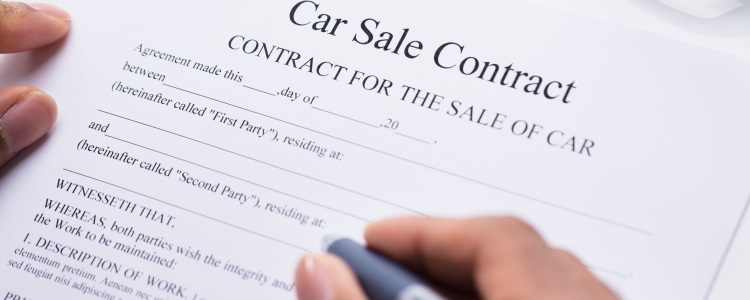Trading in your vehicle can be a hassle-free way to get rid of your old car and maybe even make a down payment on a new one. But selling your vehicle privately might earn you more cash. It all comes down to value, and how much time and work you’re willing to invest in the process. Let’s take a look at whether you should trade in or sell your car.
Trading In Your Car
 There are pros and cons involved with the process of trading in your vehicle, and whether the good outweighs the bad depends on what’s more important to you. If time is a factor, trading in is the way to go. It’s a relatively simple and quick process that involves far less hassle than selling a car yourself.
There are pros and cons involved with the process of trading in your vehicle, and whether the good outweighs the bad depends on what’s more important to you. If time is a factor, trading in is the way to go. It’s a relatively simple and quick process that involves far less hassle than selling a car yourself.
When you trade in your vehicle at a dealership, they appraise it and offer you a price. If you still owe on the car, the dealer takes care of paying off your loan. They're also going to deal with the paperwork whether you owe or not, and can even roll all or part of any equity into a down payment on your next vehicle.
Auto Credit Express Tip: Be sure to visit at least three dealerships when you’re getting your car appraised, and make sure one of them is a franchised dealer for your vehicle’s brand. This way, you get a more accurate price range, and can choose the best offer.
One thing that could be an issue when you trade in a car at a dealership, however, is money. Because dealers need to be able to resell a vehicle at a profit, you’re not likely to get as much as you could if you sold it yourself.
Selling Your Car Yourself
If you’re looking to make a bit more profit on your car and aren’t worried about saving time, selling your vehicle yourself might be the way to go. However, when you sell a car yourself, you have to do far more legwork on your own.
The first thing you need to do is find out how much your vehicle is worth. You can do this by checking online valuation sites such as Kelley Blue Book, NADAguides, or Black Book.
Remember that these sites can only give you an estimate of the actual cash value of your car. The actual value of your vehicle depends on many factors, including its make, model, year, mileage, and condition, to name a few. You may still want to have your car appraised by a dealership or two to get an idea of where to start your pricing at.
Not only do you have to price the vehicle yourself, you’re going to have to take care of the paperwork, too. Make sure you have your title on hand, as well as the paperwork required by your state for selling a car.
Also, be sure to print out a vehicle history report, which many buyers may ask to see. If you have service records that show you’ve kept up with maintenance, these may come in handy if a potential buyer questions the condition under the hood.
You may also need to go to a bank or credit union with the buyer if you still owe on your car, since you need an accurate payoff amount and must pay off your loan before the lien can be released.
Depending on the state you live in, you may also have to visit your local DMV or Secretary of State office with the buyer to transfer the title and license.
Replacing Your Vehicle
Whether you trade in your vehicle or sell it privately, you’re probably going to have to replace that car with something else. If bad credit is currently standing in your way, you’ll want a special finance dealer to help you get the auto loan you need.
These dealerships work with subprime lenders that can help people in many different credit situations, and Auto Credit Express works with one of the largest networks of special finance dealers in the nation.
We're more than just expert tips and advice, we can connect you to a local dealership. To get the process started, fill out our easy, obligation-free car loan request form today!
















